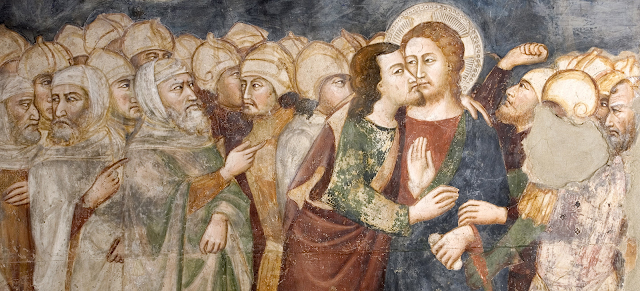"The Defence Speech of Judas Iscariot" enacted by Protestants and Catholics, both altogether modernist
A different look at the role of Judas
Hückelhoven - Judas Iscariot is the traitor - but was it really like it was written down in the Bible? A Passion Play asks questions and stimulates reflection.
A different view of things was provided by Pastor Gerhard Saß, who invited the audience to a special kind of Passion Play in the Protestant Church on Haagstraße in Hückelhoven during Holy Week. "I, Judas", the defence speech of Judas Iscariot, written by the philosopher and writer Walter Jens, was intended to enable the visitors to rearrange their thoughts and perhaps also to make a reassessment. "No person in the Bible has such a bad reputation as Judas," said Saß in his welcome to the guests and to Pastor Udo Lenzig, who read the defence speech in an impressive monologue. The name of Judas, he said, stands for greed, betrayal and murder. "Everyone can be forgiven, but not him," Saß said, and he asked, "What would actually happen to our salvation if Judas had not betrayed Jesus, if he had refused his friend's last request?"
In the defence speech, which Lenzig delivered with dynamism and persuasiveness, Jens described the events from Judas' point of view. He had been the only one of the twelve disciples who had taken upon himself the sacrifice of accepting the role of "traitor" - so that Jesus could fulfil his work of salvation on the cross. It is thanks to Judas' obedience to his Lord that Jesus' life in this world was ultimately completed. "Jesus could rely on me," Jens has the supposed betrayer say, and he continues, "No, Lord, I did not betray you." How could he, since everything about the life and work of Jesus was also known to the Romans?
Another staging of the theme on Holy Saturday
The play "Judas" by Lot Vekemanns takes another, different look at the events of Holy Week and Judas Iscariot. It will be performed on Holy Saturday, 20 April, and on Friday, 3 May, both at 8 p.m., in the Protestant church in Schwanenberg, and on Saturday, 4 May, from 8 p.m., in the Christuskirche in Heinsberg. The performers are Jan Küper as Judas, Sebastian Schade on the piano and Robin Banerjee, who is responsible for the staging and lighting.
And Lenzig convincingly explains that the reward for the betrayal was in principle meagre, "no more than the value of a worn-out garment". By accepting and squandering the 30 pieces of silver, Judas had wanted to mock the system and, by committing suicide, to remove the last doubt that he, as a true friend, wanted to stand by his friend's side even in death. "Jesus knew of my betrayal, he wanted my betrayal. We knew about each other. Me, a traitor? No, I didn't deserve that."
Jens asks different questions in the defence speech: how can Jesus talk about forgiveness and reconciliation with enemies, but not include Judas? How can Judas, as a representative of the Jewish people, be charged with a guilt from which all Jews have to suffer? "Jesus was also a Jew. Does he also deserve the yellow star?"
Suppose Judas had not committed the betrayal. What would have happened? "We don't know," Lenzig answers after the monologue in the discussion with his enthusiastically thoughtful audience. Judas would have been nothing without Jesus, "but Jesus also nothing without Judas". With the defence scripture, Jens had constructed a counter-image to the opinion of the evangelists, who wrote Judas into the role of traitor.
See also "Shrine to Judas"
Cathcon: Catholics are not immune. The Diocese of Fulda also organised a reading in the Cathedral on Good Friday as far back as 2005. Unfortunately, the news link is now well out of date. ORF made a programme last year tracing the idea that Judas, far from being a traitor, is really a saint. The spirit of this age!










.jpeg)

Comments